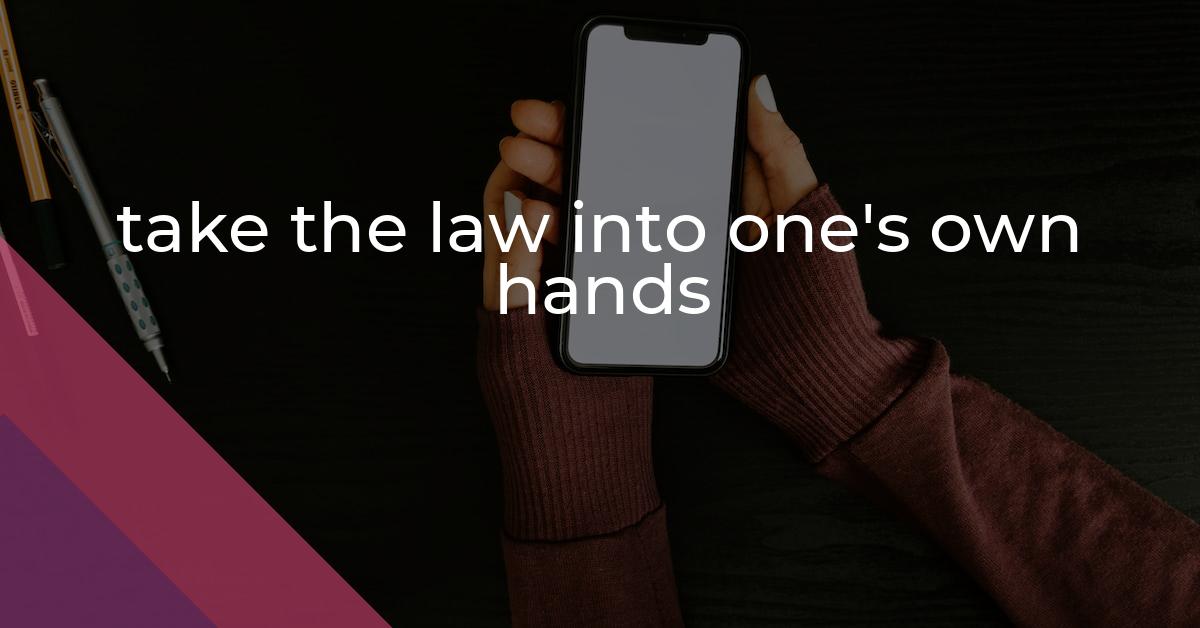take the law into one’s own hands: Idiom Meaning and Origin
What does ‘take the law into one's own hands’ mean?
The idiom "take the law into one's own hands" means to bypass the legal system and take matters into one's own control. This is usually done in an illegal or aggressive manner.

Idiom Explorer
The idiom "take to task" means to reprimand or scold someone for their actions or behavior, usually in a stern or disciplinary manner.
"Take the offensive" is an idiom meaning to initiate an attack or make a bold move in order to gain an advantage in a situation.
"Take the liberty" means to do something without asking for permission or to assume a freedom that may not be granted. It can suggest acting in a bold or presumptuous manner, often with the expectation that others will accept it.
The idiom "take the initiative" means to be proactive and make the first move or take action without being prompted or instructed.
The idiom "take the fall" means to accept blame or punishment for a mistake or wrongdoing, often to protect someone else or to avoid greater consequences.
The idiom "take the bull by the horns" means to confront or address a difficult or challenging situation head-on, without fear or hesitation. It implies to directly tackle a problem instead of avoiding it or waiting for someone else to do so.
The idiom "take one's hook" means to leave or depart, often in a sneaky or secretive manner. It conveys the idea of someone quietly removing themselves from a situation or place.
The idiom "take one's courage in both hands" means to summon up one's bravery and face a challenging or intimidating situation directly and confidently.
The idiom "take one's chance" means to seize or accept an opportunity or risk without knowing the outcome. It implies a willingness to try despite the uncertainty or potential for failure.
Unconventional Vigilante Justice
The idiom "take the law into one's own hands" is a widely used expression in the English language. It reflects the idea of individuals resorting to personal action to administer justice or seek revenge outside of the legal system. The origins of this idiom can be traced back to the concept of vigilante justice, a practice that dates back centuries.
Although the idiom "take the law into one's own hands" is commonly used, its exact origins are unclear. The idea of individuals bypassing the legal system to take matters into their own hands has likely existed as long as human societies have had legal systems. This idiom serves as a metaphorical representation of such actions. It is often used to describe situations where individuals feel compelled to intervene directly to enforce what they perceive as justice.
One possibility for the idiom's origin comes from early legal systems that relied heavily on the notion of self-help. In ancient times, legal systems were often primitive and unable to effectively address all issues of justice. As a result, individuals were frequently left to resolve disputes independently, taking action to seek justice when they felt the legal system had failed. This practice could involve acts of violence or retribution.
Another influence on the idiom may stem from the historical practice of frontier justice in America during the 19th century. In areas where law enforcement was scarce or nonexistent, individuals or communities would take it upon themselves to implement and enforce their own codes of conduct. This often involved acts of violence to punish perceived wrongdoers. In such situations, individuals felt that the legal system was unable to provide adequate protection or justice, so they took matters into their own hands.
Over time, the idiom "take the law into one's own hands" has evolved to include not only physical acts of violence but also other forms of extrajudicial action, such as boycotting, public shaming, or social media campaigns. These actions are often seen as an assertion of power or authority when individuals feel that legal remedies are inadequate. Taking it upon oneself to enforce justice outside of the legal system can be seen as an act of defiance against perceived injustices.
Though the idiom carries a sense of empowerment, it is important to note that taking the law into one's own hands is generally regarded as unlawful and outside the boundaries of society's legal framework. Engaging in vigilante justice can lead to a breakdown of social order and the potential for further violence. Individuals who take matters into their own hands may face legal consequences themselves, creating a cycle of conflict and consequences.
The idiom "take matters into one's own hands" is closely related to "take the law into one's own hands." It conveys a similar meaning but in a broader context. It refers to individuals taking it upon themselves to address a situation or solve a problem independently, without waiting for or relying on external assistance.
In situations where individuals feel that action is necessary and time is of the essence, they may take matters into their own hands to achieve a desired outcome. This can involve making decisions and taking action without seeking permission or approval from others. "Take matters into one's own hands" signifies a proactive approach to problem-solving and a willingness to take responsibility for the outcome.
The idiom "take it upon oneself" is another phrase similar in meaning to "take the law into one's own hands." When someone takes it upon themselves to do something, they assume the responsibility or task without being asked or obligated to do so. This idiom reflects a sense of personal initiative and a willingness to take on challenges independently.
Individuals who take it upon themselves to address a situation or fulfill a task often do so out of a sense of duty or a desire to make a positive impact. They may see a problem that needs to be solved or a need that should be addressed, and rather than waiting for someone else to take action, they step up and take it upon themselves to do what needs to be done. "Take it upon oneself" carries a connotation of personal agency and a willingness to go above and beyond what is expected.
The idiom "take the law into one's own hands" encapsulates the idea of individuals bypassing the legal system to administer justice or seek revenge. Its precise origins are uncertain, but it likely emerged from historical practices and the shortcomings of early legal systems. While the idiom signifies a sense of empowerment and autonomy, it also serves as a reminder of the potential dangers and consequences of vigilante justice. As society continues to evolve, the interpretation and application of this idiom may continue to expand, reflecting changes in our legal systems and societal attitudes.
Example usage
Example 1: John was frustrated with the slow progress of the police investigation, so he decided to take the law into his own hands and gather evidence himself.
Example 2: After repeatedly being a victim of crime, the neighborhood watch group decided to take the law into their own hands by patrolling the streets and detaining suspicious individuals.
Example 3: In the movie, the protagonist's family is brutally attacked, leading him to take the law into his own hands and seek revenge on the criminals responsible.
More "Justice" idioms



